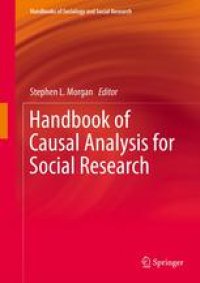
Ebook: Handbook of Causal Analysis for Social Research
- Genre: Other Social Sciences // Sociology
- Tags: Sociology general, Methodology of the Social Sciences, Statistics for Social Science Behavorial Science Education Public Policy and Law
- Series: Handbooks of Sociology and Social Research
- Year: 2013
- Publisher: Springer Netherlands
- Edition: 1
- Language: English
- pdf
What constitutes a causal explanation, and must an explanation be causal? What warrants a causal inference, as opposed to a descriptive regularity? What techniques are available to detect when causal effects are present, and when can these techniques be used to identify the relative importance of these effects? What complications do the interactions of individuals create for these techniques? When can mixed methods of analysis be used to deepen causal accounts? Must causal claims include generative mechanisms, and how effective are empirical methods designed to discover them? The Handbook of Causal Analysis for Social Research tackles these questions with nineteen chapters from leading scholars in sociology, statistics, public health, computer science, and human development.
What constitutes a causal explanation, and must an explanation be causal? What warrants a causal inference, as opposed to a descriptive regularity? What techniques are available to detect when causal effects are present, and when can these techniques be used to identify the relative importance of these effects? What complications do the interactions of individuals create for these techniques? When can mixed methods of analysis be used to deepen causal accounts? Must causal claims include generative mechanisms, and how effective are empirical methods designed to discover them? The Handbook of Causal Anlaysis for Social Research tackles these questions with nineteen chapters from leading scholars in sociology, statistics, public health, computer science, and human development.
What constitutes a causal explanation, and must an explanation be causal? What warrants a causal inference, as opposed to a descriptive regularity? What techniques are available to detect when causal effects are present, and when can these techniques be used to identify the relative importance of these effects? What complications do the interactions of individuals create for these techniques? When can mixed methods of analysis be used to deepen causal accounts? Must causal claims include generative mechanisms, and how effective are empirical methods designed to discover them? The Handbook of Causal Anlaysis for Social Research tackles these questions with nineteen chapters from leading scholars in sociology, statistics, public health, computer science, and human development.
Content:
Front Matter....Pages i-xi
Front Matter....Pages 7-7
A History of Causal Analysis in the Social Sciences....Pages 9-26
Types of Causes....Pages 27-41
Front Matter....Pages 43-43
Research Design: Toward a Realistic Role for Causal Analysis....Pages 45-73
Causal Models and Counterfactuals....Pages 75-90
Mixed Methods and Causal Analysis....Pages 91-110
Front Matter....Pages 111-111
Fixed Effects, Random Effects, and Hybrid Models for Causal Analysis....Pages 113-132
Heteroscedastic Regression Models for the Systematic Analysis of Residual Variances....Pages 133-152
Group Differences in Generalized Linear Models....Pages 153-166
Counterfactual Causal Analysis and Nonlinear Probability Models....Pages 167-187
Causal Effect Heterogeneity....Pages 189-213
New Perspectives on Causal Mediation Analysis....Pages 215-242
Front Matter....Pages 243-243
Graphical Causal Models....Pages 245-273
The Causal Implications of Mechanistic Thinking: Identification Using Directed Acyclic Graphs (DAGs)....Pages 275-299
Eight Myths About Causality and Structural Equation Models....Pages 301-328
Front Matter....Pages 329-329
Heterogeneous Agents, Social Interactions, and Causal Inference....Pages 331-352
Social Networks and Causal Inference....Pages 353-374
Front Matter....Pages 375-375
Partial Identification and Sensitivity Analysis....Pages 377-402
What You Can Learn from Wrong Causal Models....Pages 403-424
Introduction....Pages 1-5
What constitutes a causal explanation, and must an explanation be causal? What warrants a causal inference, as opposed to a descriptive regularity? What techniques are available to detect when causal effects are present, and when can these techniques be used to identify the relative importance of these effects? What complications do the interactions of individuals create for these techniques? When can mixed methods of analysis be used to deepen causal accounts? Must causal claims include generative mechanisms, and how effective are empirical methods designed to discover them? The Handbook of Causal Anlaysis for Social Research tackles these questions with nineteen chapters from leading scholars in sociology, statistics, public health, computer science, and human development.
Content:
Front Matter....Pages i-xi
Front Matter....Pages 7-7
A History of Causal Analysis in the Social Sciences....Pages 9-26
Types of Causes....Pages 27-41
Front Matter....Pages 43-43
Research Design: Toward a Realistic Role for Causal Analysis....Pages 45-73
Causal Models and Counterfactuals....Pages 75-90
Mixed Methods and Causal Analysis....Pages 91-110
Front Matter....Pages 111-111
Fixed Effects, Random Effects, and Hybrid Models for Causal Analysis....Pages 113-132
Heteroscedastic Regression Models for the Systematic Analysis of Residual Variances....Pages 133-152
Group Differences in Generalized Linear Models....Pages 153-166
Counterfactual Causal Analysis and Nonlinear Probability Models....Pages 167-187
Causal Effect Heterogeneity....Pages 189-213
New Perspectives on Causal Mediation Analysis....Pages 215-242
Front Matter....Pages 243-243
Graphical Causal Models....Pages 245-273
The Causal Implications of Mechanistic Thinking: Identification Using Directed Acyclic Graphs (DAGs)....Pages 275-299
Eight Myths About Causality and Structural Equation Models....Pages 301-328
Front Matter....Pages 329-329
Heterogeneous Agents, Social Interactions, and Causal Inference....Pages 331-352
Social Networks and Causal Inference....Pages 353-374
Front Matter....Pages 375-375
Partial Identification and Sensitivity Analysis....Pages 377-402
What You Can Learn from Wrong Causal Models....Pages 403-424
Introduction....Pages 1-5
....